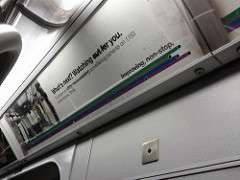Mass Transit Meets Mass Surveillance
Maryland legislators want to limit the use of listening devices on public buses.

When you think of the surveillance state, you probably think of the National Security Agency, the Federal Bureau of Investigation, the Department of Homeland Security. You probably don't think of the Maryland Transit Administration. Yet the latter agency has been installing cameras and listening devices on its buses for years. Yesterday the Maryland Senate advanced a bill to put some limits on how that hardware can be used.
The Washington Post has some background:
MTA began using recording devices inside some of its buses in 2012, without seeking legislative approval. Nearly 500 of its fleet of 750 buses now have audio recording capabilities. Officials say the devices can capture important information in cases of driver error or an attack or altercation on a bus.
Under the bill, recording devices would have to be installed near a bus or train operators' seat. The devices would be controlled by the driver and could be activated only in the event of a public-safety incident….
This is the fourth time in four years that the bill to limit the recordings has been introduced. Previous pieces of legislation have never made it out of committee, but [the Senate Judicial Proceedings] committee unanimously approved it this year.
The bill also creates a $1,000 fine for people who illegally share the government's recordings.
Objections to the bill have centered around two issues. One is the cost of replacing the existing devices. (Somehow, the people raising that concern don't seem interested in stopping the expansion of the listening system.) The other is the notion that these limits would somehow impair security. One state senator, the Montgomery County Democrat Nancy King, declared she doesn't "want to be in a position of telling the FBI they can't listen in on our buses."
The broader issue here is far larger than the MTA, and not just because several cities outside Maryland have been spying on bus riders too. Indeed, it's even larger than the potential for abuse. At this point we're used to seeing cameras everywhere; for better or worse, we've started adjusting our behavior to their presence. I don't think we're used yet to the notion that someone in a distant office can listen to private conversations we conduct in public. If that kind of eavesdropping becomes common, how might it change the ways we interact with each other?
Bonus video: ReasonTV's Todd Krainin covered Maryland's mass-transit surveillance back in 2013, when legislators narrowly rejected an earlier attempt to limit the use of these devices:
Editor's Note: As of February 29, 2024, commenting privileges on reason.com posts are limited to Reason Plus subscribers. Past commenters are grandfathered in for a temporary period. Subscribe here to preserve your ability to comment. Your Reason Plus subscription also gives you an ad-free version of reason.com, along with full access to the digital edition and archives of Reason magazine. We request that comments be civil and on-topic. We do not moderate or assume any responsibility for comments, which are owned by the readers who post them. Comments do not represent the views of reason.com or Reason Foundation. We reserve the right to delete any comment and ban commenters for any reason at any time. Comments may only be edited within 5 minutes of posting. Report abuses.
Please to post comments



One state senator, the Montgomery County Democrat Nancy King, declared she doesn't "want to be in a position of telling the FBI they can't listen in on our buses."
I presume she would be willing to wear a wire 24/7? "I wouldn't want to be in a position of telling the FBI they can't listen in on our politicians".
All I know is Elijah Cumming's office is five minutes from my house in a quaint little historical town called "Old Ellicott City." That, and Maryland buses give you AIDS.
Speaking of Maryland transporation: http://www.bethesdamagazine.co.....-Bethesda/
Welcome to Interzone. Everything you do will be monitored.
=======================
What will it do? In Soviet days you only talked honestly with people you trusted and that only in a secure place.
I don't see how a conversation held on a bus could be considered private. If you are in public everything you do is open to scrutiny.
Someone overhearing your conversation is absolutely different from the government stealing money from taxpayers to install surveillance devices in public places (also built/maintained using stolen money, but that is another matter). One, the surveillance is done by a central source with nearly unlimited resources, and also enough power to destroy individuals and organizations. Two, the surveillance is automatic, cheap, and reliable, and it can therefore be nearly ubiquitous; hiring humans would be much more costly and less reliable, so doing it on a massive scale would be nearly impossible. Three, the records can be kept forever, so they can always go back and find new ways to use the information they gather against the populace. Even if an individual makes a recording of what you're doing/saying in public, some of these things still apply. This is a general criticism of mass government surveillance of public places, not just the surveillance on buses.
We can place whatever limits on the government that we please. The government does not have some right to install surveillance equipment everywhere, and as we've seen, letting them do so is distastrous for liberty.
Reminds me of an early scene in The Wire where the police higher-ups are talking to each other while walking through the halls but once they are standing still (in an elevator) they clam up.